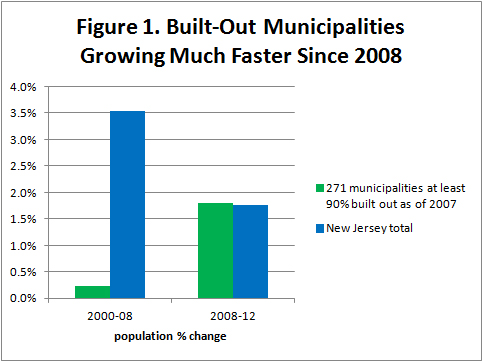New Jersey Future Blog
Convening Aims to Develop an Agenda for Change for New Jersey’s Urban Water Infrastructure
May 20th, 2014 by New Jersey Future staff
Leaders Explore Challenges and Opportunities for Revamping Water, Wastewater, and Stormwater Infrastructure in New Jersey Cities
The Johnson Foundation at Wingspread, New Jersey Future, and the Geraldine R. Dodge Foundation convened a group of New Jersey leaders from water utilities, environmental organizations, economic and community development organizations, the private sector and local, state and federal government today to develop and issue an action agenda to catalyze the transformation of New Jersey’s urban water infrastructure.

The convening is informed by research conducted by New Jersey Future and Rutgers University, which focused on the 21 New Jersey municipalities that have combined sewer systems and experience combined sewer overflows (CSOs) during intense rainfall events. Discharges from these CSO events contain raw sewage and affect some of the state’s most iconic river systems – including the Hackensack, Passaic, Raritan, and Delaware rivers – polluting the environment and threatening public health.
Furthermore, additional pressure is being put on these systems by their cities’ recent resurgence. These 21 cities comprise nearly a fifth of New Jersey’s population and are projected to absorb much of the state’s future growth, presenting an opportunity for developers and cities to work together on creating water infrastructure that will meet this demand and support the revitalization of these cities into attractive settings for employers and residents.
Participants in the convening will work together over a day and a half to identify priority action steps intended to catalyze action to address New Jersey’s urban water infrastructure challenges. The goal is to develop an “Agenda for Change” that the invited group of New Jersey leaders believes will have a real impact and that they are willing to support going forward as New Jersey Future, the Geraldine R. Dodge Foundation and other organizations develop related advocacy campaigns aimed at revamping water infrastructure in the New Jersey’s 21 CSO cities.
“Urban water infrastructure improvements present a significant opportunity for New Jersey’s cities and waterways,” said Chris Daggett, president at the Geraldine R. Dodge Foundation. “Investments lay the groundwork for future economic growth, community resiliency and improved environmental health and can be met in the broader context of urban revitalization.”
“We have an imperative to invest now in our water infrastructure, and to do so in a way that addresses tomorrow’s challenges as well as the needs of today,” said Lynn Broaddus, environment program director at the Johnson Foundation at Wingspread. “We are thrilled to be working with New Jersey Future and the Geraldine R. Dodge Foundation to facilitate the process of revitalizing New Jersey’s urban water infrastructure and enhancing quality of life for the residents of its cities.”
The Johnson Foundation at Wingspread is dedicated to serving as a catalyst for change by bringing together leading thinkers and inspiring new solutions on major environmental and regional issues. The convening and report that will follow from it are part of Charting New Waters, a Johnson Foundation at Wingspread initiative bringing together experts to examine freshwater challenges, successes, innovations and potential solutions that can bridge geographies and inform national policy. Launched by the Johnson Foundation at Wingspread in 2010, Charting New Waters is the work of a diverse group of leaders from business, agriculture, academia and environmental organizations that have publicly committed to improving U.S. freshwater resources by advancing the principles and recommendations of the group. These recommendations were captured in a consensus report: Charting New Waters: A Call to Action to Address U.S. Freshwater Challenges issued in Sept. 2010. Download the report here.




















Is any thought being given to analysing New Jersey’s aquifers? We continue to develop and consume more and more fresh water per household for more and more households, while the continued development causes more runoff and less aquifer recharge. I believe that review of every proposed development should include an anlysis of what effect it will have on the aquifer involved. There is a limited supply.